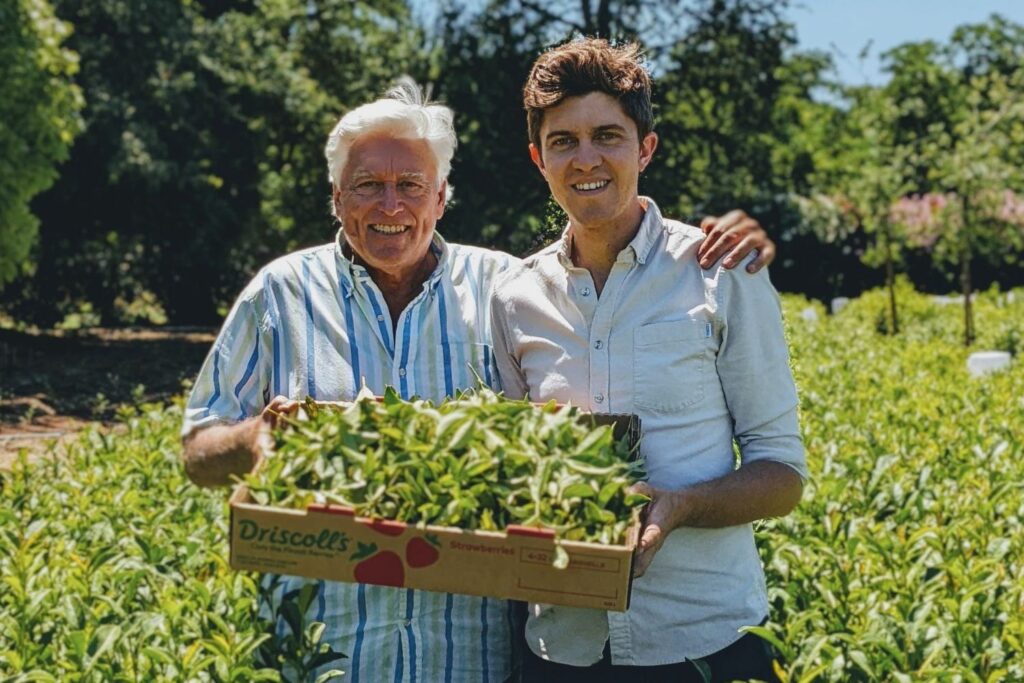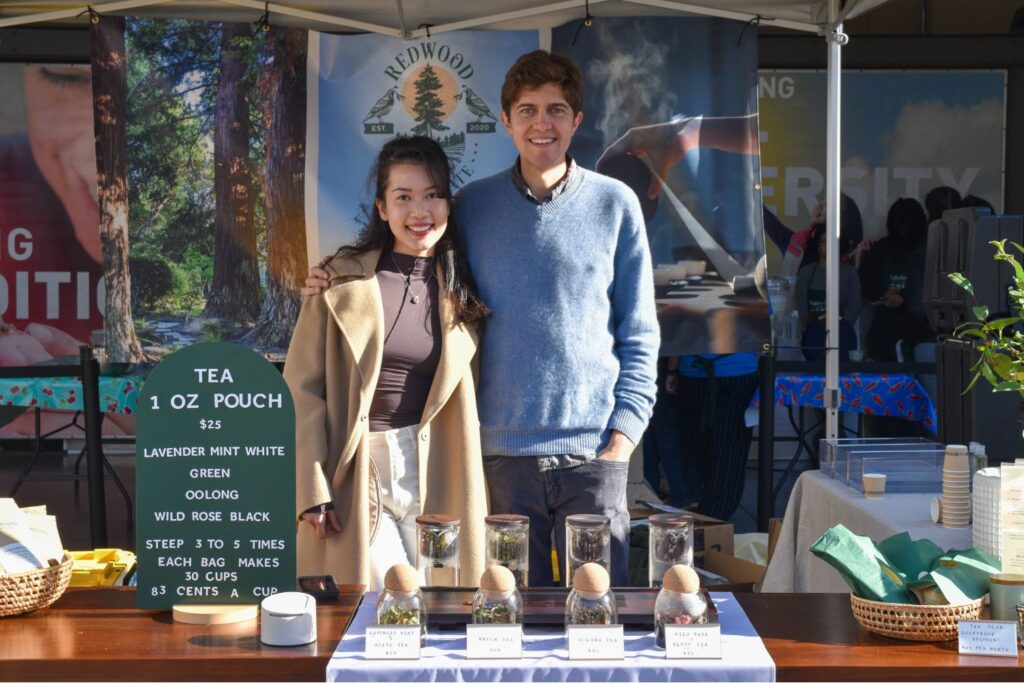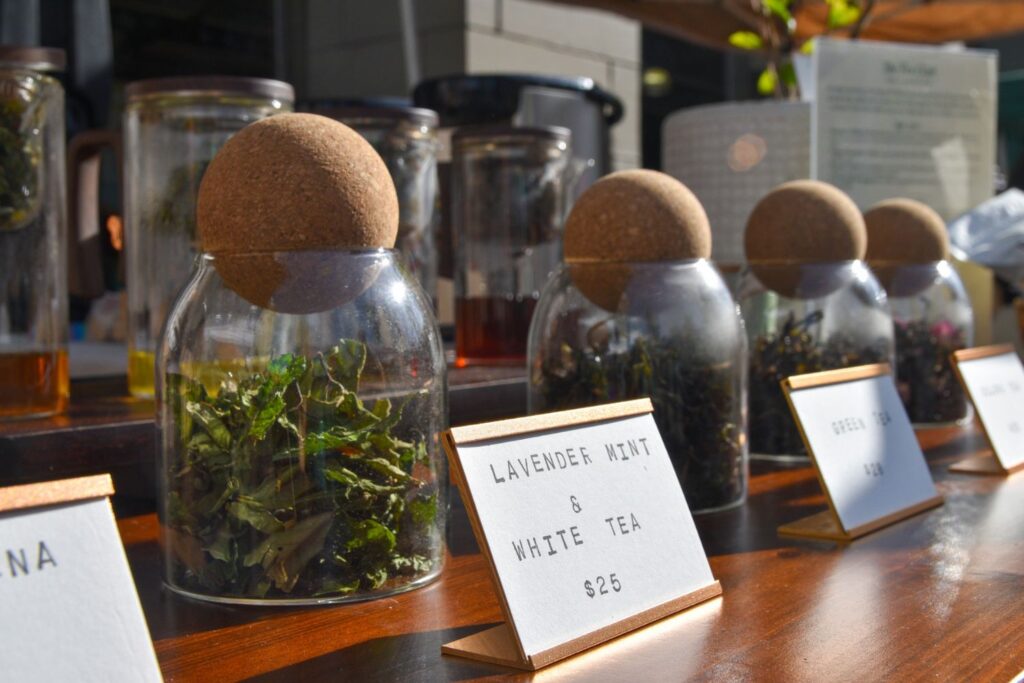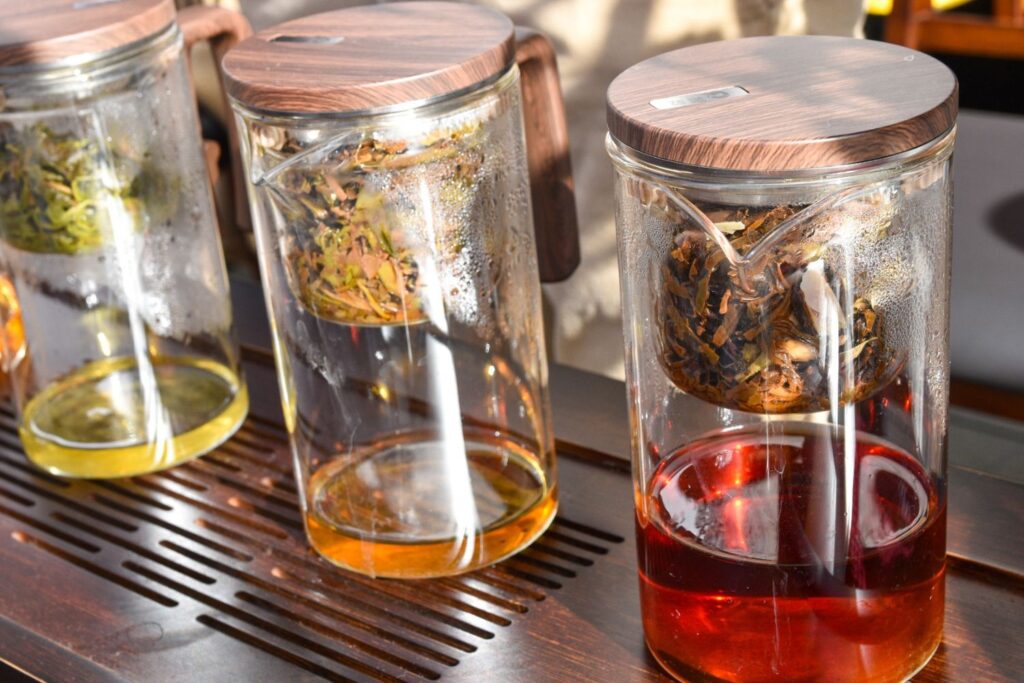This California Farm Shortens the Supply Chain for High-Quality, Loose-Leaf Tea
Sheree Bishop, Communications Coordinator
January 10, 2025

Locally grown tea is rare in California, and even at farmers markets, most artisan tea makers source leaves through the global market. Redwood Tea Estate, a fifth-generation farm based in Stockton, recently became one of a select few to sell tea grown and crafted entirely in the United States. Every Saturday, the Sunbury family brings high-quality loose-leaf tea from their farm in Stockton directly to the Ferry Plaza Farmers Market.
There are only three commercial tea farms on the West Coast and only a handful in the continental United States. This means that most of the tea in America comes from large brands that often buy from unethical suppliers. As a result, the global supply chain for tea provides next to nothing to the farmers who grow it. Together, Patrick Sunbury and his father, Eric, are creating a shortened and sustainable supply chain for tea that places quality over quantity.

From Cherry Farming to Tea Bushes and Agroforestry
The Sunbury family has been in the agricultural business for five generations. Since the 1870s, they’ve been farming in San Joaquin Valley. At first, they grew cherries for Dole in combination with selling local produce. After a death in the family, the time came for a change.
“My grandmother passed away, and her home and accompanying half-acre in Stockton, California, was sort of empty. My dad asked me if I wanted to move there and start growing tea,” Patrick says. “I had previously been working as a landscape architect, and I had unfortunately developed a neurological eye disease. I couldn’t stare at a computer for a very long time. So I agreed with my dad to do the crazy scheme of growing tea in California.”
Patrick and his father moved to Stockton and planted a tea field in 2020. On their farm, they don’t use fungicides or pesticides and instead rely on sustainable farming practices, a rarity in commercial tea production.
Redwood Tea Estate uses an agroforestry approach to growing tea, which incorporates surrounding Valley Oak trees, wildlife, and crops into their agricultural methods. The trees provide dappled shade, which reduces excessive heat and increases humidity in the summer, and native plants attract beneficial insects and birds to help control the pest population. The farm is treated as one managed ecosystem, which encourages the growth of healthy tea plants.
Now, the Ferry Plaza Farmers Market is the first in California to have Redwood Tea Estate on its roster. “It was actually one of the first times that we got to bring tea to lots of people to get feedback,” Patrick says. “People will sit and talk with me for five or 10 minutes, asking lots of different questions about the tea, which I’m happy to answer. It’s awesome to connect with people who actually care about local food.”

Think Globally, Drink Locally
Most of the tea in the world comes from China, India, Kenya, and Sri Lanka. Despite the fact that a majority of American tea drinkers are purchasing a product from another country, the global companies that bring these products to the public are often not transparent about how their tea was grown, harvested, and purchased.
Standard commercial teas are often made using unfair and abusive labor practices. In 2023, the Business & Human Rights Resource Center created the Tea Transparency Tracker, a large database with details on the working conditions in the world’s largest tea companies. In creating it, they found 70 public allegations of human rights abuses at the supplier level, linked to buyers like Starbucks Teavana, Unilever, and other large tea buyers.
In turn, these buyers also don’t put high-quality tea on the shelves. The quality of tea is graded based on the size of the leaves. The lowest grade of tea is the kind that is often found in the grocery store, as a disposable tea bag containing a powder known as dust or fannings.
“Oftentimes, those tea bags themselves are extremely toxic,” Patrick says. “They’re usually mixed with microplastics and really low-quality paper to hold it together. So, you’re getting a lot of melted microplastics with low-quality tea that’s one-dimensional and doesn’t have as much flavor.”
Drinking Local Tea Gives Farmers Their Fair Share
Redwood Tea Estate only sells loose-leaf, whole-leaf teas. As far as tea grading is concerned, these are the best teas you can get. With whole-leaf tea, you can see how the leaves were processed and tumbled, as well as how old they were when they were plucked, all from looking at the blend of herbs in your cup. “It’s like when you see marbling in a piece of meat. You can see the quality of the product and you can learn a lot about it,” Patrick says.
But this level of care and quality comes at a higher price. “It’s very hard as a small farm to compete if we’re only going to be competing against rock-bottom-priced goods. We can be competitive if we do whole leaf because that’s generally a higher quality, more expensive product,” Patrick says. “But for the average consumer, it’s still relatively affordable.”
In addition, farmers market shoppers can rest assured knowing that their funds go entirely to the farmers who cultivated their tea. When you purchase mass-produced tea from a grocery store, big-name brands get much more than their share. A report from Oxfam found that in the US, supermarkets and tea brands get “93.8% of the final consumer price for bagged black tea sold in the country, while labour costs to pay workers represents just 0.8% of the final price.”
“Tea is being grown so far away, and there are so many language and cultural and distance barriers that people aren’t able to connect with,” Patrick says, “I think people can enjoy it much more if they have a better sense of where it’s coming from, and they can be sure that they’re getting a higher quality product. They don’t have to worry that it’s done unethically and unsustainably, and it’s loaded with toxins. They can just enjoy the serenity of tea.”

How Environmental Stressors Make Soothing, High-Grade Tea
Even though drinking tea is calming, the best tea plants thrive under stress. All tea is made from the Camellia sinensis plant and its varieties. Their leaves are the source of green, yellow, pu’er, oolong, and black tea, and can be blended with other herbs such as lavender and mint for added flavor and health benefits. “Tea” can also be made as a blend of other kinds of plants, though many connoisseurs do not consider this to be “true” tea.
Patrick insists that the flavor of tea comes down to its terroir, which often refers to the climate, soil, and sunlight that give wine grapes their specific flavors. “The same tea cultivar can taste different based on the terroir. Just like wine, a Merlot grown in Napa, versus one grown in Chile, versus one grown in France are all going to taste different. It’s the same with tea.”
Even though tea is normally grown in East and Southeast Asia, the climate in Northern California can also give way to important stressors for a plant, such as strong UV exposure and large changes in temperature, also known as diurnal swings, throughout the day. Patrick says that, because of the maritime-influenced hot days and cold nights, and the strong summer sun, the Lodi region produces enough stress for flavorful tea.
Once the tea plant is ready to harvest, the leaves are combined with plants in the botanical garden at Redwood Tea Estate to create unique flavors.
“I can gather osmanthus blooms, I can gather rosebuds, I can gather lavender mint. I can gather citrus blossoms. I can gather lots of different things from the garden, and in these smaller batches, I make these unique combinations,” Patrick says, “You get the entire garden in your cup.”
Find Redwood Tea Estate in the front plaza at the Ferry Plaza Farmers Market on Saturdays.
Topics: Agribusiness, Environment, Farmers market, Farms, Labor
